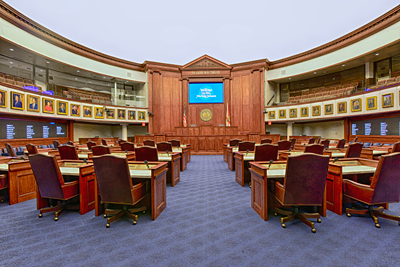By Jim Turner, The News Service of Florida
TALLAHASSEE — State senators are off to a quick start filing bills as they gear up for the 2025 legislative session, which begins March 4.
Senate President Ben Albritton, R-Wauchula, and House Speaker Daniel Perez, R-Miami, officially took over as leaders of their respective chambers for the next two years during an organizational session last week.
House and Senate committees will meet in parts of December, January and February to start sifting through proposals in the lead-up to the 60-day session.
Bills filed so far for consideration during the 2025 session include:
— A measure (SB 48) aimed at closing loopholes used in condo foreclosure auctions.
— A proposal (SB 58) that would amend boating laws and add the death of an “unborn child” to the definition “vessel homicide” through reckless boat operations that cause injury to the mother.
— A bill (SB 46) that would establish a list of programs and degrees a nonpublic, religious postsecondary educational institution may offer to be exempt from state licensure.
— A proposal (SB 56) seeking to prohibit the injection, release, or dispersion of chemicals or an apparatus into the atmosphere “for the express purpose of affecting the temperature, the weather, or the intensity of sunlight.”
The measures filed in the past week by Sens. Ileana Garcia, R-Miami, Ana Maria Rodriguez, R-Doral, and Jonathan Martin, R-Fort Myers, aren’t the first bills that were filed for the upcoming session that begins March 4.
In August, senators were able to start filing bills that seek payments for people who suffered injuries and damages because of actions of state and local government agencies.
The proposals, known as “claim” bills, are needed, at least in part, because of a state sovereign-immunity law that generally limits the amounts of money government agencies can be forced to pay in lawsuits to $200,000 or $300,000, depending on how many people are involved. Claim bills allow payments that are higher than the limits.
State lawmakers filed 1,902 bills, memorials or resolutions — including duplicate proposals filed by the House and Senate — for the 2024 legislative session, which ended in March. Gov. Ron DeSantis signed 299 of the measures into law and vetoed 14 bills. The bill totals don’t include thousands of funding requests legislators put forward for local projects, services and organizations.
Unlike their Senate counterparts, state representatives are limited to filing seven stand-alone bills.
Perez earlier this month revamped the House bill-filing process, saying House members “seemed to have been under the mistaken impression that their bills would automatically appear on a committee session” over the past two years.
“Going forward, if you wish a chair to consider hearing your bill, you will be required to ask the chair in writing to place your bill on the agenda. Your request must also include information on your anticipated Senate companion bill. Please note that while sending a letter will be a procedural prerequisite to a bill being placed on an agenda, it will not be, by itself, sufficient. Members will be expected to work their bills and fully engage not only with the chairs but with the members of the committee,” Perez wrote in a Nov. 13 memo.
Perez also created a new process for bills to be analyzed by staff members, which he said is aimed at improving “readability, usefulness, and interactivity.”
The revised procedure “will present new challenges for our staff both in adapting our current practices and in integrating the new technological features into their work,” Perez wrote in a Nov. 15 memo to members. “But we believe the outcome will be worth it. We hope this new bill analysis will enhance our understanding of issues and better prepare us to make the decisions that the people of Florida have elected us to make.”

